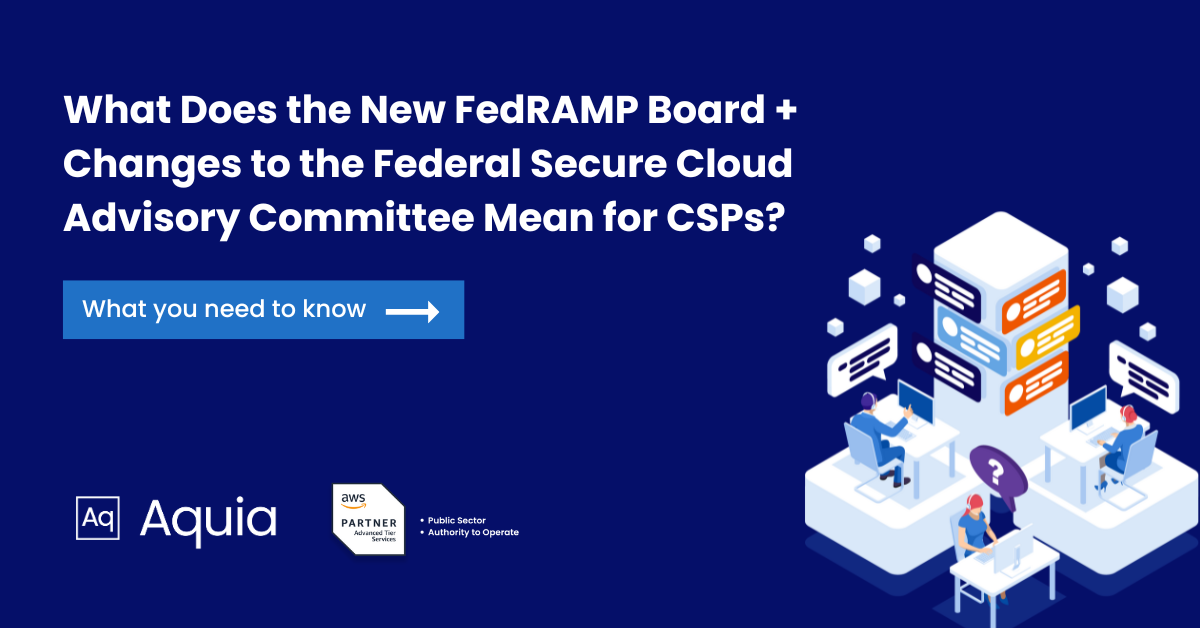Navigating The New FedRAMP Board and Federal Secure Cloud Advisory Committee (FSCAC) Changes
FedRAMP Governing Body Making Major Changes

With recent updates to FedRAMP, featuring the introduction of a new governing board and a revamped advisory committee, the landscape of cloud security within government services is set for significant changes. These developments signal a pivot toward enhancing oversight and streamlining processes to better accommodate the nature of the cloud technology landscape.
Establishment of the New FedRAMP Board
The formation of the new “FedRAMP Board” (previously the Joint Authorization Board (JAB)) by the OMB marks a critical evolution from the traditional JAB. This new board is composed of a mix of legacy and new members from key agencies, ensuring that the board not only retains a rich bedrock of experience but also injects fresh perspectives from diverse governmental spheres. This strategic infusion is intended to drive more robust and adaptive governance of cloud security standards and practices.
Changes in the Federal Secure Cloud Advisory Committee
With Lawrence Hale at the helm as chairman of the Federal Secure Cloud Advisory Committee (FSCAC) starting next week, the FSCAC is gearing up for a transformative phase. This committee’s role is increasingly crucial as it directly influences how FedRAMP advises on and facilitates the secure adoption of cloud computing across government entities. The inclusion of new members from varied backgrounds enriches the committee’s ability to offer deeper, more comprehensive insights and recommendations, aligning with the evolving threats and technologies in the cloud space.
Impact on Cloud Service Providers
For cloud service providers (CSPs), these governance shifts are likely to reshape the compliance and operational landscape. CSPs can anticipate adjustments in the authorization processes that may lead to quicker deployments and possibly more rigorous security scrutiny. Adapting to these changes quickly and effectively will be key to capitalizing on potential efficiencies and staying ahead in the competitive federal cloud services market. (GSA Executive Director of Cloud Strategy, Eric Mill, spoke to the future of FedRAMP at the recent Aquia + Amazon Web Services (AWS) 2024 Cloud Compliance Summit. View that session for additional background.)
As FedRAMP continues to evolve, its impact extends beyond just compliance to shaping the way cloud security is managed in the federal space. This shift reflects broader trends in technology governance, where integration of advanced security measures and agility are increasingly important. Both government agencies and CSPs must remain agile, ready to adapt to these changes to harness the full potential of cloud technology securely and efficiently.
In light of these changes, it is essential for stakeholders to remain engaged and proactive. For CSPs navigating the updated FedRAMP landscape, partnering with seasoned experts who understand the nuances of the new governance structures and compliance requirements is crucial. Such partnerships can provide the guidance needed to navigate these changes effectively, ensuring compliance, fostering innovation, and securing a competitive edge.
If you are interested in learning more or scheduling a consultation to discuss pursuing your FedRAMP authorization, contact us. Backed by a former FedRAMP Joint Authorization Board (JAB) technical representative member, our team understands the nuances, expectations, and critical success factors that can make all the difference when it comes to achieving authorization and scaling within the federal government and DoD.
If you would like to learn more about FedRAMP and ConMon, check out our YouTube playlist from the Cloud Compliance Summit.
If you have any questions, or would like to discuss this topic in more detail, feel free to contact us and we would be happy to schedule some time to chat about how Aquia can help you and your organization.

